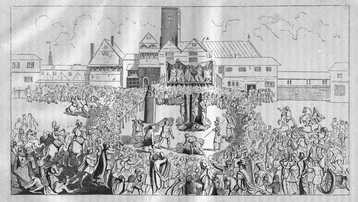Anne grew up to be a strong willed, highly intelligent woman who refused to take her husband's name of Kyme on their marriage, which is seems was an unhappy one.
In 1544, Anne was forcibly evicted from the family home by her husband. A year later she was distributing bibles and preaching Protestantism in London. No doubt highly vocal, she eventually was arrested on charges of heresy. Anne was released, but soon found herself arrested once more, this time she was committed to Newgate Prison. From Newgate, Anne was taken to the Tower of London, where she is tortured on the rack but she refused to name anyone and therefore condemned to death.
The treatment of her within the tower walls was nothing less than barbaric, it left her unable to walk and on the 16th July, she had to be carried to her execution on a chair.
Anne Ayscough remained defiant as she was burned at the stake at Smithfield, just outside the cities wall.
The following is an excerpt about Anne's death from John Foxe’s Book of Martyrs
up her body. When all things were thus prepared to the fire, Dr. Shaxton, who was then appointed to preach, began his sermon. Anne Askew, hearing and answering again unto him, where he said well, confirmed the same; where he said amiss, “There,” said she, “he misseth, and speaketh without the book.”
The sermon being finished, the martyrs, standing there tied at three several stakes ready to their martyrdom, began their prayers. The multitude and concourse of the people was exceeding; the place where they stood being railed about to keep out the press. Upon the bench under St. Bartholomew’s church sat Wriothesley, Chancellor of England; the old Duke of Norfolk, the old Earl of Bedford, the Lord Mayor, with divers others. Before the fire should be set unto them, one of the bench, hearing that they had gunpowder about them, and being alarmed lest the faggots, by strength of the gunpowder, would come flying about their ears, began to be afraid: but the Earl of Bedford, declaring unto him how the gunpowder was not laid under the faggots, but only about their bodies, to rid them out of their pain, which having vent, there was no danger to them of the faggots, so diminished that fear.
Then Wriothesley, Lord Chancellor, sent to Anne Askew letters, offering to her the king’s pardon if she would recant; who, refusing once to look upon them, made this answer again, that she came not thither to deny her Lord and Master. Then were the letters likewise offered unto the others, who, in like manner, following the constancy of the woman, denied not only to receive them, but also to look upon them. Whereupon the lord mayor, commanding fire to be put unto them, cried with a loud voice, “Fiat Justitia.”
And thus the good Anne Askew, with these blessed martyrs, being troubled so many manner of ways, and having passed through so many torments, having now ended the long course of her agonies, being compassed in with flames of fire, as a blessed sacrifice unto God, she slept in the Lord A.D. 1546, leaving behind her a singular example of Christian constancy for all men to follow."


 RSS Feed
RSS Feed
